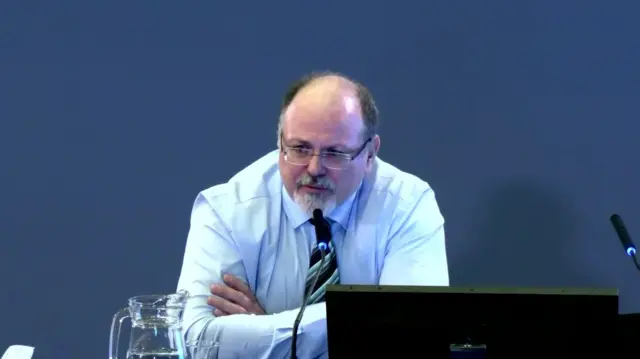Noise of the bombpublished at 11:30 GMT 19 February
He recalls the "ground jumping" under his feet.
"There is a split second the noise hits you."
He says it was the loudest noise he has ever heard.
The Omagh Bombing Inquiry is examining whether the single worst atrocity of the Troubles could have been prevented
Twenty-nine people, including a woman expecting twins, were murdered in the Real IRA attack on 15 August 1998
This is the fourth week of hearings
Edited by Conor Neeson. Warning: This page contains distressing details
He recalls the "ground jumping" under his feet.
"There is a split second the noise hits you."
He says it was the loudest noise he has ever heard.
He said his girlfriend called him upstairs to their daughter's room and when he got up to the room the bomb exploded.
He says the window was open.
The morning of the bomb was a "beautiful summer's day", Simon says.
"It was warm, it was very pleasant."
The town was busy but he didn't realise it was a bomb scare at the time. He saw traffic wardens directing traffic.
He says in the morning on the day of the bombing he was cleaning out his girlfriend's fire but he dropped the grate and was dispatched into Omagh to get a replacement.
He said he got a grate and then returned home.
He said the house was about 230m from the bomb.
Simon says the bomb "changed the trajectory of [his] career" and had a "profound impact" on him.
He moved more into community based dentistry rather than general dentistry.
He says that his medical training helped him deal with what he was seeing "to a small extent".
He said he had first-aid training but wasn't able to use it on the day and "felt useless".
This he said made him feel "guilt".
Simon says in his dental training he trained with medical students and would have done dissection.
This gave him a "grounding in dealing with human remains".
 Image source, Omagh Bombing Inquiry
Image source, Omagh Bombing InquirySimon McLarnon was a community dental officer at the time of the bombing
The inquiry is now hearing from Simon McLarnon, who was a community dental officer at the time of the bombing.
Mary says she loves her home town of Omagh and its people "dearly" but her trust for "a peaceful and safe society left that day".
She thanks those who helped in the aftermath of the bomb.
Mary says she is "angry" that there has "been limited success in finding" the people who planned and planted the bomb.
Mary says her life "irrevocably changed" as a result of the bomb - but she is thankful for the life she has had and the choice she made to move to Australia for a better life.
Mary says she is resilient, and her experience has formed the person she is today.
"I choose to do the best I can."
She says she is grateful for life and will "always think" about those who died.
She says she is lucky to have "lived loved and had a family" while this was taken away from so many.
She says it's "hard to tell your children how and why you are scarred".
She says she started by saying she was in an accident but over time told them about the bomb.
Mary says she is not alone with this and for others it's "more visual".
"So I feel mine is insignificant compared to so many."
Mary says she told her daughter about what happened.
"They've seen my scars."
She says she is reminded very time she goes to the toilet.
She says she and her husband knew they could never live in Northern Ireland but often thought about returning.
She says she "tried life in Northern Ireland" after which she emigrated to Australia
For four to five years Mary did not drive up Omagh high street.
"I could not physically pass the site of the bomb."
She eventually drove, then walked the street many years later with her husband and children.
"I thought of all those who were killed and maimed that day. I had tears but I had to be happy to be alive and well."